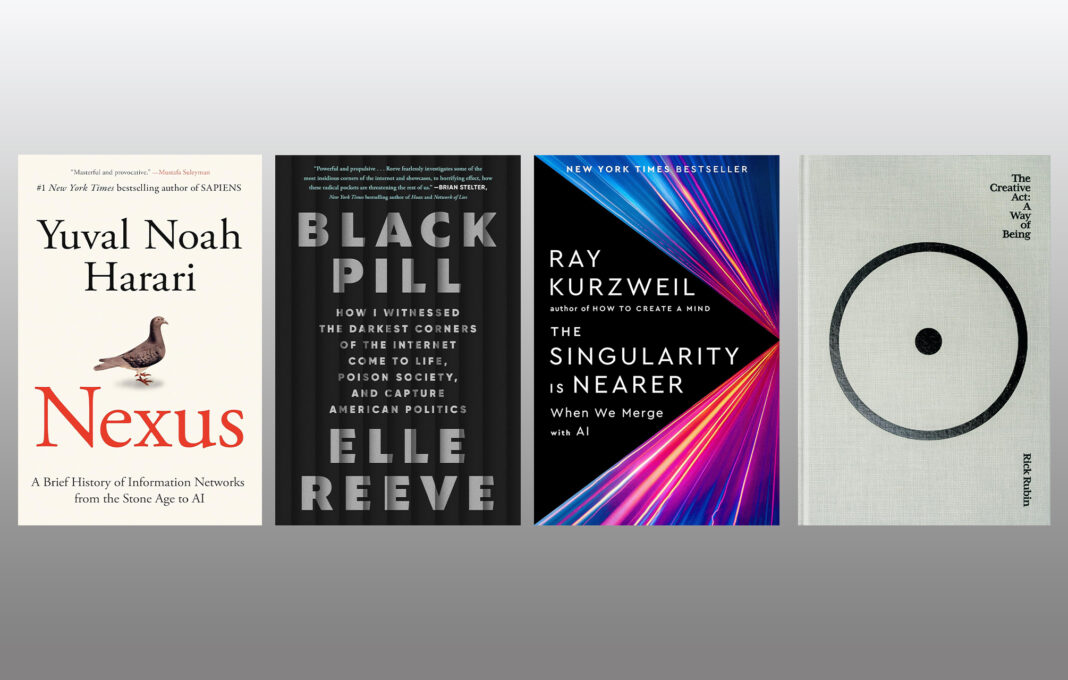Not surprisingly for those who know me, I’m a pretty voracious reader. These days I devour almost exclusively non-fiction and leave fiction for my other media consumption. I am in a constant search for fresh thoughts and perspectives and these books delivered. The following books made me think a little bit differently, which I believe is the greatest compliment you can give to any work of art. So without further ado… my list.
Nexus: A Brief History of Information Networks from the Stone Age to AI
By Yuval Noah Harari
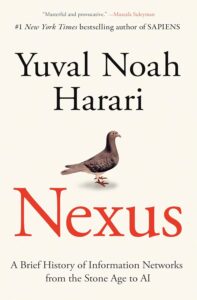 This book should be required reading to better understand what was and what is on the horizon. A core principle highlighted in the book is how information isn’t the same as truth. As we flail in our current moment of the information age, this book is shockingly relevant to current events as Harari dives through history from the witch hunts to the rise of fascism in Europe. With the rise of AI, Harari provides a framework to consider how it might impact our future based on how humanity has engaged with information in the past. One of the most profound ideas is a simple reframing of the name artificial intelligence. Harari instead identifies it as alien intelligence. The reasoning is that artificial intelligence is loaded with presumptions of control. We made it, therefore we can control it. Alien intelligence on the other hand is beyond our capacity. This is what makes AI so dangerous and also so compelling. Ultimately, Nexus brings the reader to consider how AI fits into our history of information networks and how we might respond and more importantly how we can prepare.
This book should be required reading to better understand what was and what is on the horizon. A core principle highlighted in the book is how information isn’t the same as truth. As we flail in our current moment of the information age, this book is shockingly relevant to current events as Harari dives through history from the witch hunts to the rise of fascism in Europe. With the rise of AI, Harari provides a framework to consider how it might impact our future based on how humanity has engaged with information in the past. One of the most profound ideas is a simple reframing of the name artificial intelligence. Harari instead identifies it as alien intelligence. The reasoning is that artificial intelligence is loaded with presumptions of control. We made it, therefore we can control it. Alien intelligence on the other hand is beyond our capacity. This is what makes AI so dangerous and also so compelling. Ultimately, Nexus brings the reader to consider how AI fits into our history of information networks and how we might respond and more importantly how we can prepare.
Black Pill: How I Witnessed the Darkest Corners of the Internet Come to Life, Poison Society, and Capture American Politics
By Elle Reeve
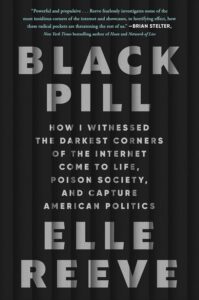 Not going to lie, this is a tough read. Not because of the density or because it’s boring. Quite the opposite. It’s a tough read because you’re taken into the darkest corners of internet culture for an up-close look at some of the worst people. If you’ve ever wondered how online culture can metastasize into real world threats, Journalist Elle Reeve connects the dots for you. From QAnon to white supremacy and toxic masculinity (in the most real sense), Reeve finds a way to make the heavy topics conversational as if you were chatting about the horror with a friend. This is a skill she undoubtedly has honed by retelling these stories for CNN. You will find yourself tense up when the Unite the Right rally happens in Charlottesville and Reeve literally jumps in the back seat with some of the main characters and takes you along for the ride. When you read Nexus you’ll quickly understand how easily and dangerously Black Pill is to swallow.
Not going to lie, this is a tough read. Not because of the density or because it’s boring. Quite the opposite. It’s a tough read because you’re taken into the darkest corners of internet culture for an up-close look at some of the worst people. If you’ve ever wondered how online culture can metastasize into real world threats, Journalist Elle Reeve connects the dots for you. From QAnon to white supremacy and toxic masculinity (in the most real sense), Reeve finds a way to make the heavy topics conversational as if you were chatting about the horror with a friend. This is a skill she undoubtedly has honed by retelling these stories for CNN. You will find yourself tense up when the Unite the Right rally happens in Charlottesville and Reeve literally jumps in the back seat with some of the main characters and takes you along for the ride. When you read Nexus you’ll quickly understand how easily and dangerously Black Pill is to swallow.
The Singularity Is Nearer: When We Merge with AI
By Ray Kurzweil
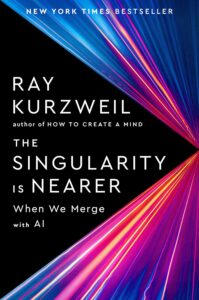 Yes, I’m obsessed with AI like so many others. For context, in a previous life I was a technology writer and editor. So when Google’s current CEO, Sundar Pichai, says AI could be more profound than fire or electricity, I sit up a little straighter. Even if he’s off by a magnitude of 100, the changes we face would be profound. That brings me to The Singularity Is Nearer. The author—for those who don’t know—is one of the preeminent minds regarding AI and was personally hired by Google co-founder, Larry Page, to lead the company into this future realm. The Singularity Is Nearer is a follow-up to Kurzweil’s earlier work The Singularity Is Near, because it’s… nearer. Everything he predicted in 2005 is coming into focus and in many instances even faster than he predicted. Reading The Singularity Is Nearer feels like you’re reading science fiction, but then you realize he’s discussing breakthroughs that are happening right now and you can see the path forward brightly illuminated. I cannot stress enough how radically different our very near future will look if just a fraction of what Kurzweil writes about comes to pass. And if you’d like to get a view of that future, add this one to your bookshelf.
Yes, I’m obsessed with AI like so many others. For context, in a previous life I was a technology writer and editor. So when Google’s current CEO, Sundar Pichai, says AI could be more profound than fire or electricity, I sit up a little straighter. Even if he’s off by a magnitude of 100, the changes we face would be profound. That brings me to The Singularity Is Nearer. The author—for those who don’t know—is one of the preeminent minds regarding AI and was personally hired by Google co-founder, Larry Page, to lead the company into this future realm. The Singularity Is Nearer is a follow-up to Kurzweil’s earlier work The Singularity Is Near, because it’s… nearer. Everything he predicted in 2005 is coming into focus and in many instances even faster than he predicted. Reading The Singularity Is Nearer feels like you’re reading science fiction, but then you realize he’s discussing breakthroughs that are happening right now and you can see the path forward brightly illuminated. I cannot stress enough how radically different our very near future will look if just a fraction of what Kurzweil writes about comes to pass. And if you’d like to get a view of that future, add this one to your bookshelf.
The Creative Act: A Way of Being
By Rick Rubin
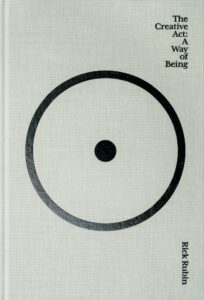 Reading this book you understand how Rubin is behind many of the most culturally significant musicians of our time. He speaks about creativity in a distilled way, like how the best poetry consolidates understanding of a topic into its pure essence in just a few sentences. As a creative, reading Rubin feels validating. He flows between idioms and personal stories that are inspiring and freeing to the creative process. His words feel concrete and ephemeral at the same time. Reading The Creative Act I kept nodding my head in affirmation. Some of the guilt by not being creative “the right way” (my personal hangups not his position) disappeared. If you’re looking to get inspired and feel boxed in, open to just about any page in this book and you’ll soon be well on your way to creating something new for this world.
Reading this book you understand how Rubin is behind many of the most culturally significant musicians of our time. He speaks about creativity in a distilled way, like how the best poetry consolidates understanding of a topic into its pure essence in just a few sentences. As a creative, reading Rubin feels validating. He flows between idioms and personal stories that are inspiring and freeing to the creative process. His words feel concrete and ephemeral at the same time. Reading The Creative Act I kept nodding my head in affirmation. Some of the guilt by not being creative “the right way” (my personal hangups not his position) disappeared. If you’re looking to get inspired and feel boxed in, open to just about any page in this book and you’ll soon be well on your way to creating something new for this world.


